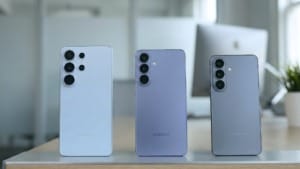Huawei gives developers access to HarmonyOS 6, reveals AI tools and next-gen cloud tech
Huawei launches HarmonyOS 6 beta for developers with AI agents, new Pangu models, and cloud upgrades in the latest push for software independence.

Huawei is giving you a closer look at the future of its tech ecosystem. On June 21, the company unveiled HarmonyOS 6, its newest operating system version, and a set of powerful AI tools and cloud computing architecture designed to push Huawei further into the artificial intelligence space.
Table Of Content
This announcement came during Huawei’s annual developer conference, where company leaders showcased how HarmonyOS is evolving as a smartphone OS and a full ecosystem platform across devices, industries, and cloud services.
HarmonyOS 6 opens to developers with new AI features
You now have access to the beta version of HarmonyOS 6 if you’re a developer. Richard Yu Chengdong, chairman of Huawei’s consumer business group, announced during the conference. He confirmed that developers can start building with HarmonyOS 6 immediately, although a public release date hasn’t yet been shared.
The new version introduces AI agents and digital assistants who can automatically perform tasks for you. You don’t even need to train your models. Huawei’s new HarmonyOS Agent Framework lets developers create these agents easily using pre-built tools and systems.
According to Huawei, over 50 AI agents are already lined up for public release, including contributions from major Chinese platforms such as Weibo and Ximalaya. These AI features are intended to simplify daily interactions and offer tailored services across devices.
Despite these advancements, Yu admitted that HarmonyOS still trails behind Apple’s iOS and Google’s Android in global market share and app availability. However, he pointed out that the top 5,000 apps already meet nearly all users’ daily needs. They account for 99.9% of user time on Huawei devices.
HarmonyOS 5 is currently installed on more than 40 device models. The ecosystem now supports over 30,000 apps and “atomic services”—small programs that don’t require installation. Huawei also reports that more than 8 million developers are engaged with its platform.
Huawei introduces stronger AI with new Pangu models
As part of its growing AI push, Huawei has also revealed version 5.5 of its Pangu AI models. These include a natural language processing (NLP) model with an incredible 718 billion parameters and a computer vision model with 15 billion parameters. In simple terms, parameters are the building blocks that help AI models learn and make predictions.
These new models are not just for show—they’re being developed with real-world use in mind. Huawei targets five key industries: medicine, finance, governance, manufacturing, and automotive. The goal is to offer tailored solutions that meet the needs of each sector.
Huawei began moving its devices to HarmonyOS in 2021, following restrictions placed on the company by the US in 2019. Since then, its in-house software efforts have been accelerated. The company has shipped over 103 million smartphones and 21 million tablets running HarmonyOS. Nearly half of those were shipped this year, showing rapid platform adoption.
CloudMatrix 384 unveiled as Huawei’s latest cloud breakthrough
You’re also getting a new look at Huawei’s powerful cloud technology. The company announced that its AI-focused cloud server has been upgraded to the CloudMatrix 384 Supernode architecture, which launched in April. This upgrade is designed to offer stronger performance for clients building and training AI applications.
The architecture includes 384 Ascend neural processing units—chips designed explicitly for AI—and 192 Kunpeng central processing units. These enhancements will help Huawei compete directly with Nvidia’s top-of-the-line GB200 NVL72 system.
Huawei cloud expert Yun Zhou presented the technical details during the event. In a paper released this week, Huawei claimed that its CloudMatrix 384 outperforms Nvidia’s H800 graphics cards when running DeepSeek’s R1 reasoning model. If true, this would mark a significant step forward in China’s efforts to develop home-grown AI and computing technology.
Huawei’s strategy is clear: build a complete, self-reliant tech ecosystem that no longer depends on US components or software. With HarmonyOS 6, the Pangu AI models, and CloudMatrix 384, the company is making that vision look more realistic than ever.
















